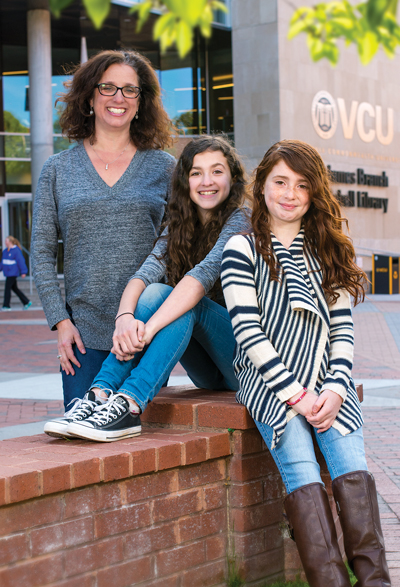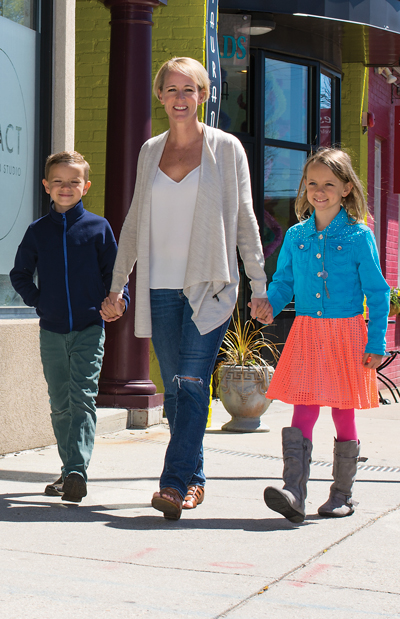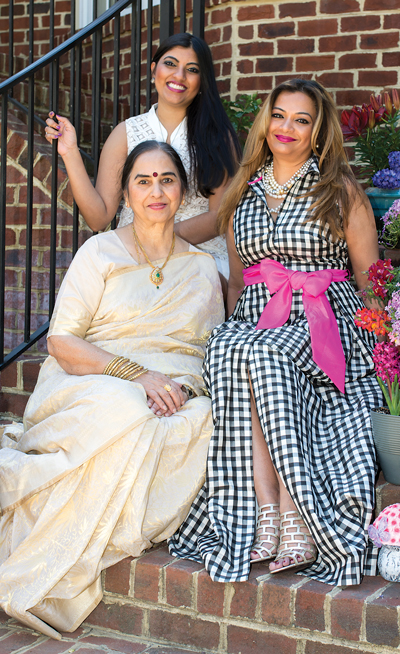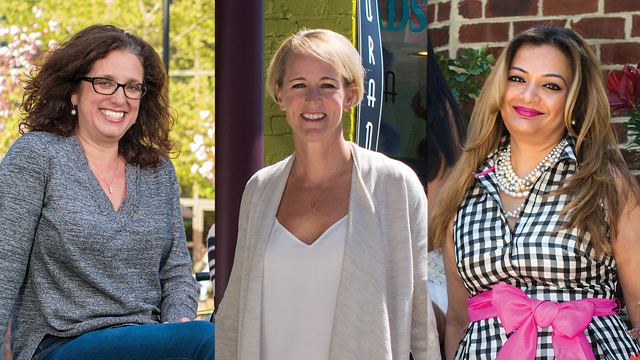Being a mother is a lifelong adventure with rewards that can’t be measured. This month, as we celebrate Mother’s Day, we asked three Richmond women to share their thoughts on the wonderful, dutiful, and sometimes stressful juggling act that is motherhood.
 Lisa Freiman
Lisa Freiman
“It’s intense to juggle schedules and family.”
Family bedtime rituals are sacred to Lisa Freiman, PhD. They have been since her two daughters, Tess Coleman, ten, and Michaela Coleman, twelve, were toddlers. “It’s a nice time for all of us to wind down together and hear stories,” Lisa says. “Before they went to sleep, the kids got to choose three books to read.”
The girls would cuddle with their mom and dad in their comfy king-sized bed in their Henrico home. “More often than not, my husband (Ed Coleman) would do the reading,” Lisa says, noting that her younger daughter is now reading some of the stories out loud. “It’s a good way to end our days.”
Family time is always a welcome event in their busy household. Ed teaches English at Maggie L. Walker Governor’s School and Lisa is the director of Virginia Commonwealth University’s new Institute for Contemporary Art (ICA). “We both have full-time jobs with a lot of responsibility,” Lisa says.
The kids have their after-school activities. Michaela is involved in horseback riding and Tess is into gymnastics. Both attend Hebrew school. “It’s intense to juggle schedules and family,” Lisa says.
Before moving to Richmond, Lisa served as senior curator and chair of the contemporary art department at the Indianapolis Museum of Art (IMA). She spearheaded the IMA’s opening of 100 Acres: The Virginia B. Fairbanks Art & Nature Park in 2010.
“The children grew up with my husband and me both working. We would host famous artists in our home for dinner. That became normal to the kids,” says Lisa, adding that she loved being able to share that type of experience with her children. “They got to understand museums and art differently
than many kids.”
They often referred to the IMA as “It’s Mommy’s art,” she says laughing. “They called it ‘Mommy’s museum.’”
Now Lisa is building not only a new world-class art institute, but also a university art museum. Construction is currently underway on the first floor of the project, with a 2017 completion date.
A typical day starts on Lisa’s ride to work with calls often to places such as New York or London. “Every day I am fully scheduled,” she says. “I go from thing to thing to thing. It’s never the same day twice.”
She tries to get home for dinner between six and seven. If one of the girls has an event, she guards that time on her calendar. “I protect those things,” she says.
Even with a hectic schedule, Lisa tries to stay open and accessible to her daughters. “They come to my office and meet the people I am working with. It’s great for them to understand what it takes to do what I am doing,” she says, noting that her office is currently in a storefront on Broad Street, about two blocks from the ICA construction site.
She acknowledges that balancing work and life isn’t an easy task, and is extremely grateful for her husband’s support. For example, she was invited to be part of a delegation to China for work for two weeks and told her husband about the opportunity. “He said, ‘Of course you have to go,’” she recalls.
The couple has never hired an au pair or live-in nanny to take care of the kids. “Ed has made so much possible for me by being so gracious and generous,” Lisa says. “He never thinks twice about it. We have balance in our relationship. He will make dinner, and I do too. It’s a real partnership.”
The flow at home is often interrupted by her intense travel schedule. In the last six weeks, she has traveled to New York City, Connecticut, and three cities in California. “I’m in New York City a lot because there is so much happening there that I am connected with,” she says. “Right now, I am doing a lot of benchmarking with other university art museums or museums that just reopened.”
Lisa didn’t have any preconceived notions of motherhood before becoming a mother. “It’s so hard to understand what it means to have a child until you have one,” she says. “We had really wanted to have kids for a long time. When I finally had my older daughter in-vitro, we were so ecstatic we could have a child.”
She quickly learned that the child “determines the rhythm of the family,” she says. “The reality is children force a type of discipline on you to be there for them. It was a complete readjustment of our rhythms as a couple.”
She and her husband make it a point to give the girls experiences in the region. They schedule a lot of family trips to the mountains and the beach, going for long walks and scouting for waterfalls. “We tend to have a lot of fun,” Lisa says. “We laugh a lot and make a lot of jokes and try to focus on cultural and educational experiences. We are so committed to helping our children become good human beings who are ethical and kind and will contribute to the world.”
She understands that every moment you are not with your kids is a moment that disappears. “They are growing up so fast,” she says. “You have to enjoy it and pay attention because it goes by so fast. At this age, they become more independent. It’s unbelievable to experience it.”
 Katherine Wintsch
Katherine Wintsch
“…there are mothers all over the world questioning if they are doing a good job.”
Being a mother means the world to successful entrepreneur Katherine Wintsch. “It’s always changing, always challenging and always rewarding, but it’s not always easy,” says the mother of 8-year-old Layla and 6-year-old Alex.
Katherine and her husband, Richard, are very involved in parenting their children. “We have a great system of dividing and conquering that works really well for our family,” she says. “From the first night we brought our daughter home, we have always shared parenting fifty-fifty. We never discussed it.”
For example, Richard handles all of the aspects of after-school activities, from scheduling to organizing. Katherine is in charge of food and nutrition. “We have his domain and her domain,” she says. “That is how we divide and conquer. We divvy up big chunks of the kids’ lives so no one person gets overwhelmed with the responsibility.”
Katherine’s experiences growing up have shaped the way she looks at motherhood. “I grew up in a very loving family with two kids and two parents who are still married today,” she says. “I had dreams of replicating what I saw as a young girl.”
She had always planned on having three children until, she says, she had two. “For some reason, I had an image in my mind of three kids, but we live very busy, very full lives, and the thoughts of doing that with three became out of reach.”
After she had Alex, Katherine, whose background is in marketing and advertising, started to look at the way companies were talking to and marketing to mothers. What she saw intrigued her. She found that companies were idealizing and glamorizing motherhood through their products and advertising. “That was not my experience,” she says.
Katherine believed that companies needed to have a better idea of what it’s really like to be a mother. She launched The Mom Complex to help companies develop better products and services to make the lives of mothers easier. She now works with large companies like Walmart, Unilever, Johnson & Johnson, The Discovery Network, and Playskool. Her research and expertise have been featured in the media in outlets that include The Today Show, The New York Times, The Wall Street Journal, and Fast Company. In addition, she writes about the aspects of modern motherhood in her blog, In All Honesty, and for The Huffington Post and Working Mother Magazine.
She finds that studying the lives of moms benefits her both professionally and personally. For example, her company conducted a global study with moms in seventeen countries to uncover one emotion that mothers around the world have in common. That emotion turns out to be doubt, more specifically self-doubt. “That helped me feel less alone by knowing there are mothers all over the world questioning if they are doing a good job,” she says. “That made me feel normal.”
Her 2013 TEDx Talk encouraged mothers to be honest about how challenging motherhood really is. “I’ve learned that it never gets easier, but the expectation is that people think they are going to figure it out one day, and that just doesn’t happen,” says Katherine.
Even though her schedule is jam-packed with meetings, speaking engagements, and business travel, she treasures any family events that are on her calendar. “My world revolves around my calendar,” she says, adding that she also puts the kids’ school activities on her calendar “as far in advance as I can and I try to protect them.”
Whenever she has the opportunity, she likes to include her kids in her business accomplishments. They helped her last year when she served as the 2015 Richmond Christmas Mother, and they accompanied her to the Advertising Women of New York’s gala in New York where she was awarded Working Mother of the Year. Katherine also won the Rising Star award from the Richmond Chapter of the National Association of Business Owners at its 2016 Women of Excellence Awards.
She and her family enjoy traveling together whenever they can, going to Mexico for spring break, or skiing in the winter. They love to go on bike rides together and Katherine often takes them roller-skating. “It makes me feel like I am fifteen years old again,” she says, adding that they live in Westover Hills where the children have lots of friends. “We have a blast.”
The family has also signed on to eating dinner together. “We weren’t prioritizing it,” she says. “We are trying to get better at that. If all four of us are at home, we eat together.”
What does she feel is the most challenging part of being a mom? “That you never really have it figured out,” she says. “Each age comes with new challenges and situations you have never had to deal with before. It’s a constant learning curve.”
 Lakshmi Challa
Lakshmi Challa
“If what you are doing makes you a better person – whether you work at home or go outside of the home to work – you become better in every aspect of your life.”
Attorney Lakshmi Challa doesn’t believe there is a perfect fifty-fifty work/life balance. “I don’t think you can have that,” she says. “You have to create an infrastructure at home for support. When I can only give 20 percent, my husband is there giving 80 percent.”
Lakshmi and her husband, Shekar, had an arranged marriage in India. “My parents wanted me to be a doctor and when I said no, they got me married,” she says, adding that her mother, Rajeswari Gollakota, who now lives in Chester, always wanted her daughters to work to add a sense of purpose to their lives.
After Lakshmi and Shekar were wed, she told her new husband her dream was to go to law school in America. “I thought he forgot about it,” she says. “Five years later, when our daughter was three years old, we came to the U.S.”
One night her husband came home with a Law School Admission Test (LSAT) prep book and reminded Lakshmi that she had told him she wanted to go to law school. “He was a student at Virginia Commonwealth University, and we were only making $800 a month. We had no car,” she says. “He told me those were either barriers or hurdles, and that we could do this together.”
After graduating, Lakshmi worked at a law firm. It was the early 1990s, a time when the legal field was changing how it viewed the topic of work/life balance, especially for female attorneys who wanted to advance in the firm. “It was hard to say I needed to bring my kids in the office,” she says, “I was fortunate I worked at a firm where the managing partner understood that.”
She was working long hours, and one night she came home and saw her husband trying to make dinner. “This is a man who was brought up in India where his mother did everything for him,” she says. “He doesn’t know how to make cabbage. It was totally black and burned, but it was phenomenal in the sense of showing me his support.”
The incident made her realize that most days, she was getting to the office at seven-thirty in the morning and not getting home until ten at night. “The kids were in bed when I got home,” she says. “I felt like I had proven myself at the office, so I told them that I needed to leave early at four two days a week. Those two days, I was able to pick up my kids, make dinner, and read a bedtime story.”
Later, technology gave her even more freedom to work from home. “I was able to cook dinner every night,” she says, which meant Shekar didn’t have to perfect his cabbage.
Lakshmi founded her own law firm, Challa Law, fifteen years ago, and now has offices in North Carolina and India in addition to Richmond. She specializes in business immigration, representing the State of Virginia and state agencies, universities, IT firms, and biotech companies.
In 2016, she traveled to India with SelectUSA, an arm of the Department of Commerce, sharing the stage with consular officials to talk about foreign businesses investing and spending in the U.S. Two years ago, she served on President Obama’s White House Roundtable to Innovation and Immigration. She was also invited to the White House to talk to select administration officials on immigration issues.
When she opened her office, she created a space where her children – daughter Chandni, now twenty-nine, and son, Chirag, now twenty-two, could come and do homework or help out. Even now, staff can bring their kids into the office. “At one point, Chandni was ordering supplies,” Lakshmi says. “The kids got to see what it was like to build a business.”
Chandni enjoyed those moments with her mom. “Her business and our home were never separated,” says Chandni. “I would go to the office to do homework or go there to have lunch with mom. It was never a siloed experience. There was always an in-and-out flow.”
Lakshmi, who was named one of the YWCA’S Outstanding Women for 2016, believes that working has enhanced her role as mother. “It made me a more well-rounded individual,” she says. “If what you are doing at the time makes you a better person – whether you work at home or go outside of the home to work – you become better in every aspect of your life – a better wife, a better mom.”
When Lakshmi was at home, family always came first. “When we sat down together for dinner, my son would call it the black hole,” she says. “Once we sat down, it was three hours later before we got up.”
She prides herself on her time management skills. “That is really critical,” she says. “We have a very busy social life.”
Lakshmi attended all of her daughter’s dance recitals and debates and her son’s basketball games and practices when they were in school. “When I say she sacrificed herself to make everything work, she really did,” says Chandni. “She has served as a role model for me – showing me what to do and also what not to do. I have learned quite a bit just watching her and being with her. She was everybody’s everything.”
If there was anything that Lakshmi didn’t invest enough time in, it was herself. “I wanted to be with my kids when I could spend time with them. If I could change anything, it would be to spend more time on me,” she says. “As you get older, you understand health is really critical. You can integrate that in when you first start working. If that becomes a priority like everything else, you are able to do more.”




